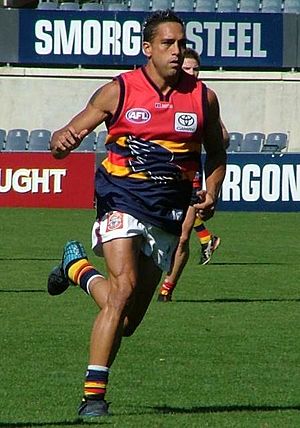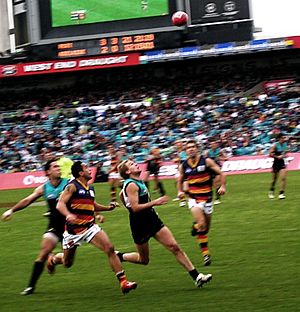Andrew McLeod facts for kids
Quick facts for kids Andrew McLeod |
|||
|---|---|---|---|

McLeod playing for Adelaide in 2005
|
|||
| Personal information | |||
| Full name | Andrew Luke McLeod | ||
| Nickname(s) | Bunji, Macca | ||
| Date of birth | 4 August 1976 | ||
| Place of birth | Darwin, Northern Territory, Australia | ||
| Original team | Darwin (NTFL)/Port Adelaide (SANFL) | ||
| Draft | Traded from Fremantle, 1994 AFL Draft | ||
| Position(s) | Half-back, half forward, midfield | ||
| Career highlights | |||
|
|||
Andrew Luke McLeod (born 4 August 1976) is a retired professional Australian rules football player. He played his entire career with the Adelaide Football Club in the Australian Football League (AFL). McLeod holds the record for the most games played for Adelaide, with 340 matches.
Many people consider McLeod to be the greatest player in the history of the Adelaide Crows. He was a key player in the team's two premiership victories in 1997 and 1998. In both of those Grand Finals, he won the Norm Smith Medal for being the best player on the field.
Contents
Early Life and Family
Andrew McLeod was born in Darwin, Northern Territory. He is an Indigenous Australian, with Wardaman and Warrgamay heritage from his mother's side. His father, Jock McLeod, has Scottish roots. Andrew was the youngest of three children.
As a child, McLeod was a fan of the Essendon Football Club. He looked up to another player from Darwin, Michael McLean.
My idol was Michael Mclean, number 51. I loved watching him play. He always gave me time when he came home. Seeing him on TV... and then when he came home you got to sit down with him and have a chat. He'd talk about what training you needed to do and the big league.
Starting His Football Journey
McLeod was a talented athlete who played many sports, including soccer, rugby, and Australian rules football. His family had a strong connection to the Darwin Football Club, so he began playing for their senior team in 1993.
His skill caught the attention of the Port Adelaide Football Club in the South Australian league (SANFL). His father, Jock, knew that moving to Adelaide would be a big change for his son. He made a secret plan with the club. Jock drove Andrew to Adelaide and left him there to focus on his football career.
Although it was a tough start, McLeod quickly proved his talent. He moved up from the junior teams to the senior team in just one season. In 1994, he helped Port Adelaide win the SANFL premiership.
When the Fremantle Football Club joined the AFL in 1995, they wanted to recruit McLeod. However, McLeod felt disrespected during their meeting and refused to play for them. The Adelaide Football Club heard about this and quickly arranged a trade to bring him to their team.
A Legendary AFL Career
First Years and a Famous Goal (1995–1996)
McLeod made his AFL debut in 1995. In only his second game, he became a hero. In the final seconds of a match against Hawthorn, Adelaide was losing. McLeod got the ball near the boundary line, dodged a defender, and kicked a tricky goal to win the game.
His coach at the time, Robert Shaw, described the moment as miraculous. McLeod had to deal with foot injuries that season. The team's sponsor, Adidas, made boots that didn't fit him properly. He secretly wore Puma boots painted with Adidas stripes until Adidas agreed to make custom shoes for him.
Becoming a Champion (1997–1999)
Under new coach Malcolm Blight, 1997 was McLeod's breakout year. Blight moved him to the half-back position, where his speed and skill could be used to start attacks.
In the 1997 Preliminary Final, Adelaide was losing badly at half-time. Blight moved McLeod into the midfield, and he helped inspire an amazing comeback victory. In the Grand Final against St Kilda, McLeod had 31 disposals and was named the best player on the ground, winning the Norm Smith Medal. Adelaide won its first-ever premiership.
The next year, in 1998, McLeod was just as brilliant. In the Preliminary Final, he kicked a career-high seven goals. In the Grand Final against the Kangaroos, he was again the best player, winning his second Norm Smith Medal. He became the first player to win the award in back-to-back years since 1988.
A Star of the League (2000–2004)
In 2000 and 2001, McLeod became one of the best midfielders in the AFL. In 2001, he had an amazing season and won the Leigh Matthews Trophy, an award voted on by other players for the league's most valuable player.
He was the favourite to win the Brownlow Medal, the AFL's highest individual honour. However, in a controversial result, he finished as the runner-up to Jason Akermanis. Many people, including Akermanis himself, believed McLeod deserved to win.
Over the next few years, McLeod continued to be a star player for Adelaide, consistently polling well in the Brownlow Medal votes and leading his team.
Later Career and Records (2005–2010)
Under coach Neil Craig, McLeod returned to the half-back line. His skill and experience were vital for the team. In 2005, he was named co-captain of the Australian team for the International Rules Series against Ireland and won the Jim Stynes Medal as the best player.
In 2006, he was selected for the All-Australian team for the fourth time. Unfortunately, a foot injury required surgery, and he missed part of the season. He made a surprise return for the preliminary final, but Adelaide lost a close game.
McLeod had another fantastic season in 2007, winning his third Best and Fairest award for Adelaide and being named captain of the All-Australian team.
In 2008, he played his 300th AFL game. The following year, in 2009, he played his 313th game, breaking the record for most games played for the Adelaide Crows.
After struggling with a knee injury, Andrew McLeod announced his retirement from the AFL on 23 August 2010. He left the game as a true legend of the sport and the Adelaide Football Club.
After the AFL
In 2011, McLeod played for the Northern Territory Football Club in the North East Australian Football League (NEAFL). He helped the team win the premiership in the league's first season.
Statistics
| G | Goals | B | Behinds | K | Kicks | H | Handballs | D | Disposals | M | Marks | T | Tackles |
| Season | Team | No. | Games | Totals | Averages (per game) | Votes | ||||||||||||
|---|---|---|---|---|---|---|---|---|---|---|---|---|---|---|---|---|---|---|
| G | B | K | H | D | M | T | G | B | K | H | D | M | T | |||||
| 1995 | Adelaide | 23 | 15 | 17 | 12 | 101 | 61 | 162 | 20 | 18 | 1.1 | 0.8 | 6.7 | 4.1 | 10.8 | 1.3 | 1.2 | 0 |
| 1996 | Adelaide | 23 | 19 | 20 | 12 | 110 | 84 | 194 | 31 | 22 | 1.1 | 0.6 | 5.8 | 4.4 | 10.2 | 1.6 | 1.2 | 0 |
| 1997# | Adelaide | 23 | 26 | 10 | 8 | 287 | 151 | 438 | 96 | 51 | 0.4 | 0.3 | 11.0 | 5.8 | 16.8 | 3.7 | 2.0 | 1 |
| 1998# | Adelaide | 23 | 19 | 30 | 20 | 232 | 101 | 333 | 67 | 42 | 1.6 | 1.1 | 12.2 | 5.3 | 17.5 | 3.5 | 2.2 | 10 |
| 1999 | Adelaide | 23 | 22 | 21 | 13 | 281 | 127 | 408 | 82 | 35 | 1.0 | 0.6 | 12.8 | 5.8 | 18.5 | 3.7 | 1.6 | 7 |
| 2000 | Adelaide | 23 | 22 | 28 | 14 | 371 | 153 | 524 | 80 | 49 | 1.3 | 0.6 | 16.9 | 7.0 | 23.8 | 3.6 | 2.2 | 20 |
| 2001 | Adelaide | 23 | 23 | 29 | 27 | 408 | 160 | 568 | 71 | 63 | 1.3 | 1.2 | 17.7 | 7.0 | 24.7 | 3.1 | 2.7 | 21 |
| 2002 | Adelaide | 23 | 23 | 25 | 22 | 322 | 190 | 512 | 76 | 74 | 1.1 | 1.0 | 14.0 | 8.3 | 22.3 | 3.3 | 3.2 | 16 |
| 2003 | Adelaide | 23 | 24 | 29 | 14 | 327 | 172 | 499 | 45 | 65 | 1.2 | 0.6 | 13.6 | 7.2 | 20.8 | 1.9 | 2.7 | 18 |
| 2004 | Adelaide | 23 | 22 | 13 | 12 | 312 | 160 | 472 | 61 | 67 | 0.6 | 0.5 | 14.2 | 7.3 | 21.5 | 2.8 | 3.0 | 2 |
| 2005 | Adelaide | 23 | 25 | 13 | 13 | 301 | 155 | 456 | 73 | 51 | 0.5 | 0.5 | 12.0 | 6.2 | 18.2 | 2.9 | 2.0 | 11 |
| 2006 | Adelaide | 23 | 20 | 6 | 6 | 287 | 159 | 446 | 93 | 51 | 0.3 | 0.3 | 14.4 | 8.0 | 22.3 | 4.7 | 2.6 | 7 |
| 2007 | Adelaide | 23 | 23 | 6 | 5 | 373 | 177 | 550 | 81 | 40 | 0.3 | 0.2 | 16.2 | 7.7 | 23.9 | 3.5 | 1.7 | 15 |
| 2008 | Adelaide | 23 | 21 | 9 | 5 | 297 | 129 | 426 | 69 | 34 | 0.4 | 0.2 | 14.1 | 6.1 | 20.3 | 3.3 | 1.6 | 4 |
| 2009 | Adelaide | 23 | 24 | 10 | 10 | 310 | 212 | 522 | 76 | 60 | 0.4 | 0.4 | 12.9 | 8.8 | 21.8 | 3.2 | 1.7 | 7 |
| 2010 | Adelaide | 23 | 12 | 9 | 3 | 121 | 93 | 214 | 36 | 30 | 0.8 | 0.3 | 10.1 | 7.8 | 17.8 | 3.0 | 2.5 | 3 |
| Career | 340 | 275 | 196 | 4440 | 2284 | 6724 | 1057 | 752 | 0.8 | 0.6 | 13.1 | 6.7 | 19.8 | 3.1 | 2.2 | 142 | ||
Honours and achievements
- AFL
- Team
- Individual
- VFLPA MVP Award (Later named the Leigh Matthews Trophy): 2001
- Malcolm Blight Medal (Adelaide F.C. Best & Fairest): 1997, 2001, 2007
- Norm Smith Medal: 1997, 1998
- All-Australian: 1998, 2000, 2001, 2006, 2007 (C)
- Australian Representative Honours in International Rules Football: 2001, 2002, 2005 (C)
- Jim Stynes Medal: 2005
- Indigenous All-Stars Representative Honours: 2003 (C), 2005, 2007 (C), 2009 (C)
- Polly Farmer Medal: 2007
- Dream Team Representative Honours in AFL Hall of Fame Tribute Match: 2008 (C)
- Michael Tuck Medal: 2003
- Showdown Medal: 2007 (Round 3)
- AFL Rising Star Nominee: 1995 (Round 20)
- 300 Game Player
- Adelaide F.C. Games Record Holder: 340 Games
- Indigenous Team of the Century - Ruck Rover
- Merv Agars Medal: 2000, 2001
- SANFL
- Team
- SANFL Premiership (Port Adelaide): 1994
- Team
- NEAFL
- Team
- NEAFL Premiership (Northern Territory): 2011
- Team
 | Calvin Brent |
 | Walter T. Bailey |
 | Martha Cassell Thompson |
 | Alberta Jeannette Cassell |


